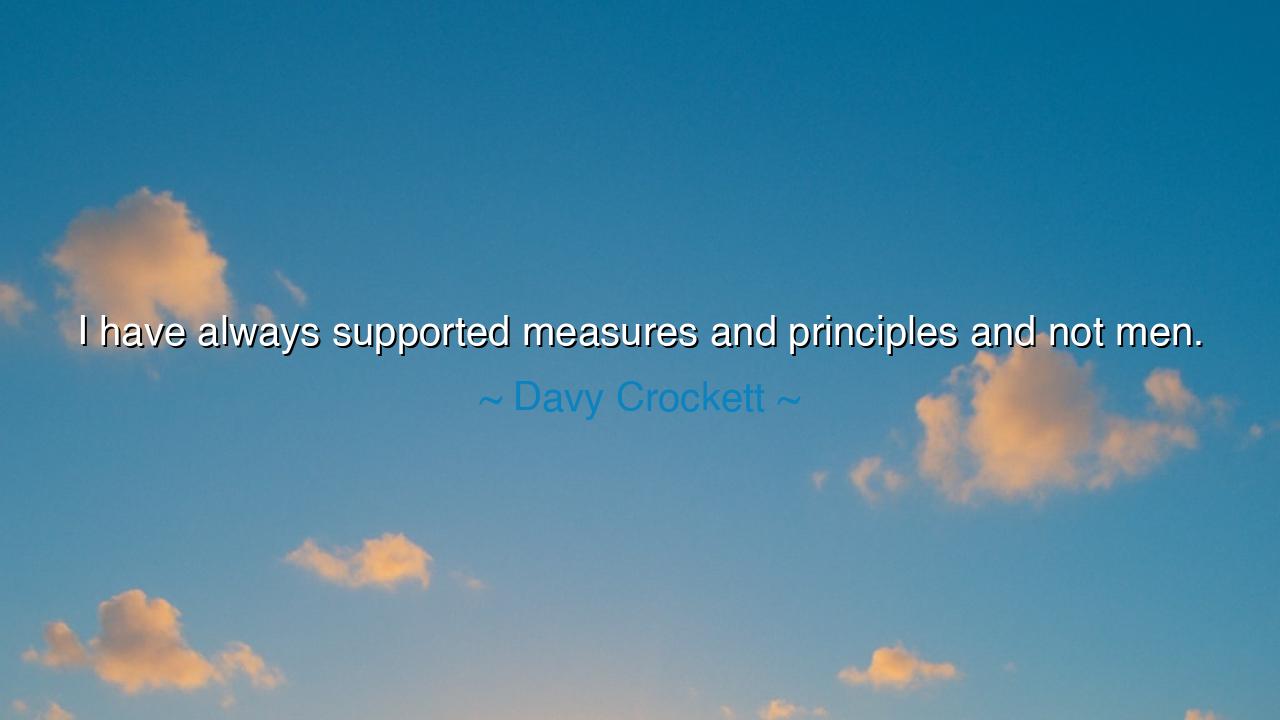
I have always supported measures and principles and not men.






The words of Davy Crockett, “I have always supported measures and principles and not men,” stand as a fiery beacon for all who walk in the realms of politics, leadership, and justice. Spoken by a frontiersman, soldier, and congressman, these words cut through the fog of personal loyalty and declare allegiance not to shifting personalities but to enduring truths. For men are fallible, given to error, passion, and ambition. But principles—honor, truth, liberty, justice—these endure like mountains, unshaken by the tempests of time.
Crockett himself knew the danger of blind loyalty. In his career, he often broke ranks with his own party when conscience demanded it. Most famously, he opposed President Andrew Jackson’s Indian Removal Act, though Jackson was not only a fellow Tennessean but also a towering political force of the era. Many expected Crockett to follow the man; instead, he followed his principles. He declared that he would rather be faithful to what is right and be defeated than betray his conscience for the sake of personal or political gain. Though his stance cost him dearly in politics, it secured his place in history as a man of integrity.
This teaching is ancient in its essence. The Romans spoke of “fiat justitia ruat caelum”—let justice be done though the heavens fall. The wise understood that loyalty to individuals, however mighty, must always be weighed against loyalty to truth itself. Leaders rise and fall, but the ideals that sustain civilizations must be guarded with unwavering devotion. To bind oneself only to men is to risk being carried into error; but to bind oneself to principles is to walk the straight path, even when others abandon it.
Consider also the story of Sir Thomas More, chancellor of England, who refused to endorse King Henry VIII’s claim to supremacy over the Church. He might have preserved his favor, his wealth, and his life by following the man. Instead, he clung to his principles, declaring that he would die “the King’s good servant, but God’s first.” He was executed for his refusal, but his martyrdom has echoed for centuries, showing that fidelity to principle is stronger than any earthly power.
The meaning of Crockett’s words is thus both courageous and costly. To support “measures and principles and not men” is to declare independence from flattery, from fear, and from tribal allegiance. It demands that one’s loyalty be given not to personalities but to truth itself. It is the harder road, for men who refuse to bow to power are often scorned, cast out, or forgotten in their time. Yet in the long march of history, their names shine brighter than those who won favor by compromise.
The lesson for us is clear: in our own lives, we must anchor ourselves to principles rather than personalities. In work, in politics, in friendship, even in family, we will face choices where loyalty to a person may conflict with loyalty to truth. In those moments, we must ask ourselves: “Do I follow the man, or do I follow what is right?” The courageous answer, though difficult, is to stand with the principle, even if it costs comfort, approval, or gain.
The practical path is this: define the principles that govern your life. Write them, speak them, live them. Let them be the compass by which you navigate decisions, great and small. When men change or betray your trust, let your loyalty remain firm in what is just and true. Seek companions and leaders who honor principles, but never give to any man the place that truth alone deserves.
Therefore, O listener, take up Crockett’s creed as your own: “I have always supported measures and principles and not men.” In this lies true freedom, true honor, and true leadership. For men are but fleeting shadows, but principles are the stars that guide us through the night. Follow them faithfully, and you shall never be lost.






AAdministratorAdministrator
Welcome, honored guests. Please leave a comment, we will respond soon